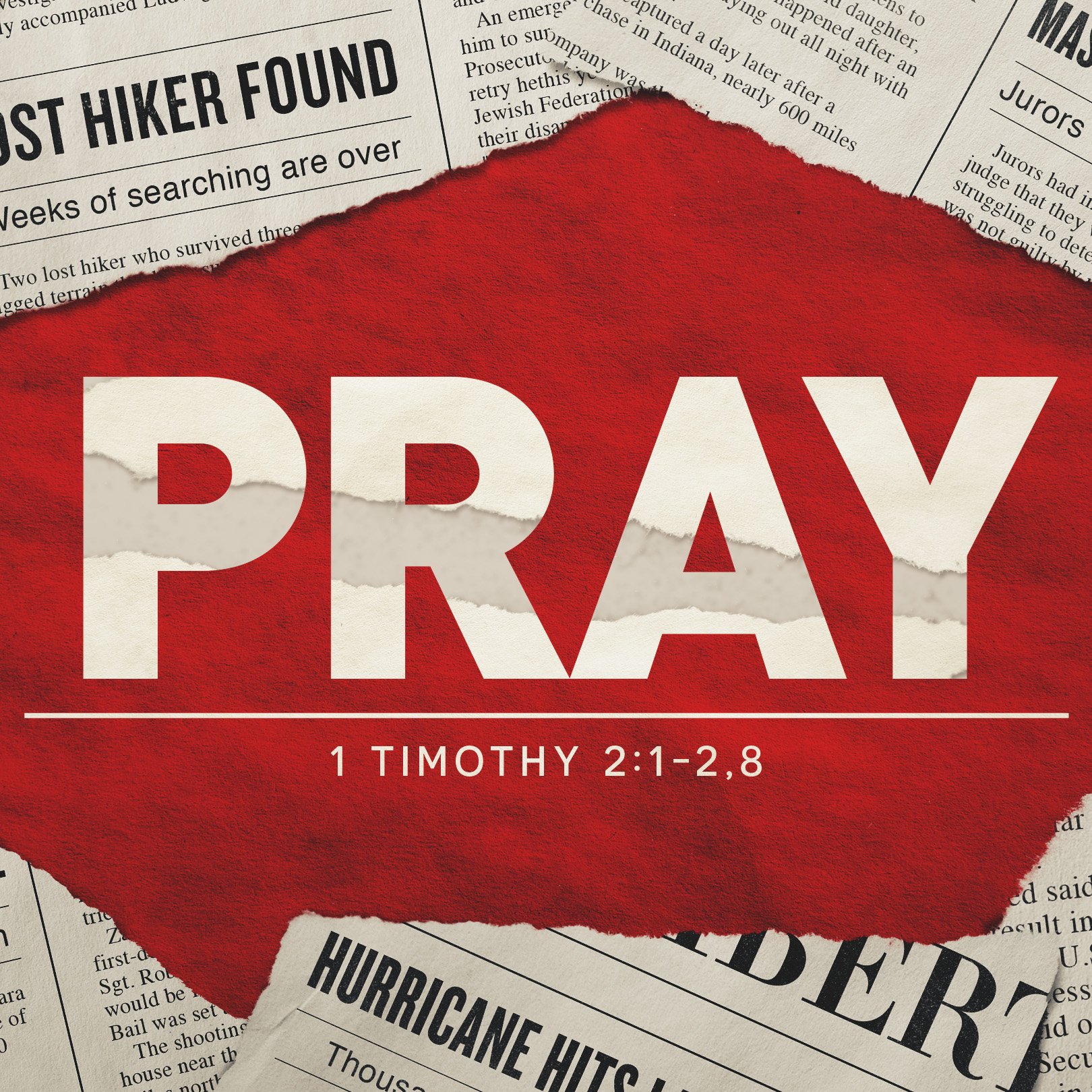All for the Kingdom
Sermon Podcast
The Church: Pillar and Buttress of Truth, 1 Timothy 3:14-16
The sad reality of the present-day church culture is the lost understanding of the church's witness to God's truth and the hope of the gospel. Every faithful church and every church member should be living witness in their community to the truth of God and the hope of the gospel. This is the heart behind Paul's instructions in 1 Timothy 3:14-16. This passage teaches who has authority over the church, its purpose, and its message.
Rediscovering the Office of Deacon, 1 Timothy 3:8-13
It is no secret that the office of deacon in many Baptist churches is not rightly ordered. Because this office, in living memory, has functioned according to practical conventions rather than biblical directives, many people have antidotal stories that illustrate the dysfunction that this has produced. Though these stories are part of our experience, they are not helpful to us today, and I have chosen to give them little attention. Rather, I think it best to give my attention to preaching a biblical understanding of this office.
A disordered church and church leadership create dysfunction. Dysfunction creates dissatisfaction with and confusion over the purpose of biblical offices. There are three common responses to such dissatisfaction and confusion.
Reject and disband the office entirely.
Limit or remove the authority and responsibility from the office.
Create new positions according to human wisdom and practical solutions to perform the tasks formally assigned to deacons.
The disorder of the deacon's office resulted from the practical taking precedence over the biblical. These responses continue in this trajectory by attempting to correct the issue with practical and secular solutions.
The only faithful response to disorder in the church is to return to faithful obedience to a biblical order. This includes the biblically assigned responsibilities, tasks, and authorities of the offices of the church.
In verses 8-13, Paul gives the qualifications for deacons. From this passage, I want you to gain a biblical understanding of the office, the qualifications for it, and the honor of it.
Sanctity of Life, Psalm 139:13-16
The sanctity of life for Christians is not a political issue. The sanctity of life for Christians is a convictional issue that before the Lord, every human life is made by God and holy before God.
Psalm 139 is a psalm of David and a powerful word on the omnipresence of God. Verses 13-16 come in response to David marveling that God knows everything about him. Building on this, David declares that every human life is the glorious masterpiece of God, known by God, and the intentional work of God.
The Lord is Holy, Psalm 11
This is a Psalm of David, but it is unknown what situation he is writing about. From the first two verses, we learn that he is being threatened by evil persons and has received the counsel to flee for safety. However, in the situation that was the occasion of this psalm, David was led by the Lord not to flee from whatever was threatening his life. He trusted his life and well-being to the provision of God. Psalm 11 is not about David’s bravery, wisdom, tenacity, or leadership. This psalm is about who God is.
The division of the psalm is in two parts. It begins with a statement and question, followed by a testimony of who God is. The first part is a declaration of faith: “In the Lord, I take my refuge (vs. 1).” The evidence of this faith is that David rejects the suggestion that he should flee like a bird. The second part is verses 4-7, which testify that God is holy, actively working, and eternally righteous.
The Lord is King Forever, Psalm 10
This world is corrupted and filled with wickedness. Psalm 10 addresses the wickedness of this world and the destruction that such evil brings, particularly to the weak and vulnerable. However, you must be careful not to assume that the wickedness exposed in Psalm 10 applies to someone else. This psalm does not confront the classical atheism of those who openly reject the existence of God but functional atheism of living as though there is no God.
The psalm calls believers not to settle for the things of this world but to long for the kingdom to come when the king who is king forever will fully reign.
And while there is an opportunity, it beckons all to bow the knee, confess Jesus as Lord, and surrender yourself to the king who is king forever.
Be Doers of the Word, James 1:19-27
I hope you and your family had a blessed Christmas celebration and a happy new year.
Podcast episodes post a week and a half after the date I preach the sermon. Usually, for podcast listeners, this makes little difference. However, during special occasions like Christmas, it is more obvious that the podcast episodes are behind.
I had the opportunity to hear a fellow pastor in our community preach, and I was out of the pulpit for a Sunday, so I do not have a current sermon for the podcast this week. So, I have pulled one from the archives for today's podcast. In 2020, I preached through the book of James. Originally preached on August 2, 2020, this is the third sermon I preached from James. The sermon is titled Be Doers of the Word, and it is from James 1:19-27.
This simple command – be doers of the word and not hears only – is a much more difficult command to obey and a much more costly truth than you may realize. Many believers have the desire to live out the word in their lives. However, desire is not a guarantee of doing. James teaches that constant, conscious, and conspicuous efforts must be made to demonstrate that your faith is more than a facade and is what is true of who you are.
Above Every Name: Jesus - The Hope of Salvation, Isaiah 9:7, 1 Thessalonians 5:8-11
The gospel of Matthew (2:20-23) tells us that God sent an angel to Joseph in a dream to tell him that the child that Mary was carrying was conceived by the Holy Spirit. The angel also instructed Joseph that the son Mary would bear would be named Jesus because "he will save his people from their sins." The name Jesus is a Greek transliteration of the Hebrew name Joshua, which means the Lord saves.
The New Testament celebrates the fulfillment of Isaiah's prophetic promise. One of the earliest books in the New Testament is 1 Thessalonians. In chapter 5, Paul gives instructions for how Christians are to live in the context of a wicked and broken world. Specifically, Christians are to live in a posture of expectation of the imminent return of Jesus.
The connection between Isaiah 9:7 and 1 Thessalonians 5 is one of timing and perspective. Isaiah is looking forward to the day that the Messiah will come. Paul, writing to the Thessalonians, is rejoicing that Jesus the Messiah has come and is looking forward to when he will return. Isaiah looks forward to the Messiah coming to establish his kingdom. Paul is rejoicing that the kingdom of God has come and is looking forward to the day when the fullness of it is known.
From these two passages, we are encouraged to have a perspective of hope in the promise of salvation that enables us to persevere in the present.
Above Every Name: Everlasting Father Prince of Peace, Isaiah 9:6, 1 Corinthians 15:54-57
The last two names listed in Isaiah 9:6 for the Messiah are Everlasting Father and Prince of Peace. These two names point to the eternal nature of the Messiah and the work of redemption he has accomplished.
In 1 Corinthians 15, Paul teaches that the resurrection of Jesus is fundamental to the work of redemption and celebrates the victory over sin and death that Jesus' resurrection has brought. The redemption of Jesus provides eternal salvation and eternal peace to those who believe in faith in Jesus.
Above Every Name: Wonderful Counselor Mighty God, Isaiah 9:6, John 14:6
Isaiah declares that Jesus will be called – wonderful counselor and mighty God. Wonderful counselor acknowledges that the Messiah will be one who reveals the glorious truth of God, and Mighty God declares that he is God and exercises the power of God. The Messiah will be God, revealing the truth of himself to the world.
In the New Testament, one of the clearest declarations of this comes in John chapter 14. Jesus was encouraging his disciples that he was preparing an eternal dwelling place in his Father's house for those who believe in God and in him. Thomas asked Jesus how they would know the way to his Father's house. Jesus responded that He was the way, the truth, the life, and salvation was only through him.
With this declaration, Jesus made it clear that the hope of the gospel was exclusively through and in himself.
Above Every Name: Immanuel, Isaiah 9:6, Philippians 2:5-11
Isaiah 9:6 is a familiar passage often read during Advent. This Advent season, I will be preaching each sermon from Isaiah 9:6 with attention to the names given to the Messiah.
Today, we consider the first two phrases of the passage: “For to us a child is born, to us a son is given.” In these two phrases, we have a foundational truth of the hope of the gospel declaring the nature of Jesus. Jesus is both and, at the same time, all God and all man. These two natures are united in the person of Jesus. He is all God and all man.
Isaiah prophesied this glorious mystery in Isaiah 9:6 when he declared that unto us would be born a child (man) and a son would be given (God). The gospel of Matthew tells us that God sent an angel to Joseph to declare to him that the baby that Mary conceived was of the Holy Spirit and was the one for whom the prophet Isaiah foretold and would be called Immanuel (which means God with us) (Matthew 1:18-25).
The glorious hope of Christmas is that God came, in the flesh, to redeem us from our sins. The prophet Isaiah declared this future hope, and the New Testament celebrates the fulfillment of this hope. Philippians 2:5-11
teaches this fundamental truth and testifies that Jesus coming in the flesh was an act of grace, a gift of love, and there is hope in the name of Jesus.
Courageous Giving, Mark 12:38-44
In contrast to the celebrated scribes, Jesus draws his disciple's attention to the place where people brought their temple offerings. Their attention was naturally drawn to those making large gifts, but Jesus wanted them to witness something greater.
Jesus pointed to the poor widow's offering as a greater offering in the sight of God, not because of worldly value but because of the heart of worship. From the widow's offering and Jesus' teaching, we find the principles that giving is good, must be sacrificial, and is an act of worship.
Gratitude or Greed, Joshua 7:16-26
The testimony of Achan's sin testifies to the danger of greed and the importance of being thankful for God's provisions. Gratitude and thanksgiving are the responses to God's provision and grace. Greed is the sin of being ungrateful and taking what has not been provided.
This passage teaches us to be thankful for God's provision and honor him with what He provides.
Qualifications for Overseers, 1 Timothy 3:1-7
We generally have a love-hate relationship with qualifications. We rightly desire that those who provide services, like doctors and airline pilots, be well-qualified. And yet, when faced with requirements that restrict something you want to do, your appreciation for the goodness of qualifications drastically wanes. In the current cultural context, where personal autonomy is seen as supremely important, any discussion of disqualifying qualifications is not well received.
The church's well-being, health, and effectiveness are greatly affected by and dependant on the leadership of the church. If the church fails to choose qualified men to serve as overseers, it will soon reap disastrous results
Rediscovering the Office of Overseer, 1 Timothy 3:1
No church is perfectly rightly ordered; however, every church must have a heart to be as rightly ordered and faithful to scripture as possible. 1 Timothy 3 continues the teaching on the proper order of the church and the offices of overseer/ elder/ pastor and deacon. To introduce a biblical understanding of the office of overseer/ elder/ pastor, I will discuss these three areas: the problem (Where we are and how we got here), the terms (rediscovering the terms the Bible uses for those who lead the church), and the office (from 3: 1).
Godly Living for Christian Woman, 1 Timothy 2:9-15
Few subjects are more fraught with difficulty than the issue this text addresses. In our cultural context, it feels awkward at best and dangerous at worst to declare what women should and should not wear, how women should fix their hair, remain quiet in church, and be submissive. The awkwardness of the cultural context does not release the church from preaching such passages and certainly not Christians from obeying what this passage teaches. To faithfully preach the Bible, a pastor must proclaim what the Bible teaches regardless of how well it is received by the culture of the day.
In the second half of 1 Timothy 2, Paul turns his attention to the proper order of the church. In this text, he addresses women's role in the church, particularly in public worship. This text addresses three areas for Christian women: how you present yourself in worship, participate in worship, and honor God's design for women.
Jesus Christ Ransom for All, 1 Timothy 2:3-7
When lives are in danger, the first impulse is to think about how they can be rescued. The most horrifying situations are when there is no hope of saving those in danger. The gospel's good news is that God desires to rescue you and has provided a way for your salvation in Jesus.
Chapter two begins Paul's instructions to Timothy on the proper order of the church. Before addressing these issues, he lays the foundational truths of the church's call to prayer and the forgiveness of sin only in Jesus. In this sermon, I show the good gift of redemption, the desire of God to save, and man's only hope is in Jesus.
Pray, 1 Timothy 2:1-2, 8
Chapter two begins Paul’s instructions to Timothy on the proper order of the church. However, before addressing these issues, he first lays the foundational truths of the church’s call to prayer and the forgiveness of sin that is only in Jesus.
You learned in elementary English class to look for the what, who, how, and why. Likewise, this sermon will focus on the what, who, how, and why of prayer.
Shipwrecked, 1 Timothy 1:18-20
When you travel by ship, there is a moment when you realize that your safety is totally dependent on the integrity of the ship. When the ship leaves the dock, it does so slowly enough that the safety of the land seems to linger and remain within reach. However, as the ship sails further to sea, your sight of land grows smaller and more distant. At the distance of 2.9 miles, any sight of land finally slips beyond your site as the curvature of the earth limits your vision. When any sight of land is lost, and all you can see is water in every direction, is the moment that you realize that your life rests entirely in the ship's ability to reach the next port. As the sun sets and darkness cloaks all but what the ship's lights can illuminate, the feeling of dependency on the ship for safety is made all the more profound.
Paul knew something about shipwrecks. He had experienced near-death experiences in multiple shipwrecks. With these memories in mind, he writes to Timothy a charge to fight the good fight for the gospel and a warning of the grave consequences that come from rejecting the gospel.
Jesus Saves, 1 Timothy 1:12-17
For all the advancements in modern media, the most effective marketing approach has remained unchanged since the creation of time. The most effective and powerful persuasive tactic is personal testimony. It is helpful to hear about all the features of a product and how it could improve your life. However, what will draw your attention and acceptance toward purchasing something is when someone you know says, I use it; it helped me; you should use it too.
In this passage, Paul declares that the primary purpose of Jesus coming in the flesh to earth was to save sinners. In making this point, he shares his personal testimony of salvation, his sin before Christ, and the grace that he has now received. Through his testimony, we see the common depravity all experience, the hope of salvation through Jesus, and the testimony and worship that follows.
The Law is Good, 1 Timothy 1:8-11
Every profession has those who are incompetent, malevolent, or abusive. When you experience unlawful use of authority, a common reaction is to reject the whole. As a result, the reflective response of many today is to tear down institutions rather than work to repair them. A biblical worldview recognizes the sin of the individual while maintaining the goodness of the institution or position.
Paul is responding to the false teachers who were perverting the law of God. They were using the law unlawfully and thus destructively. Paul does not reject the law but affirms it as good when lawfully used for the purposes and glory of God.




















